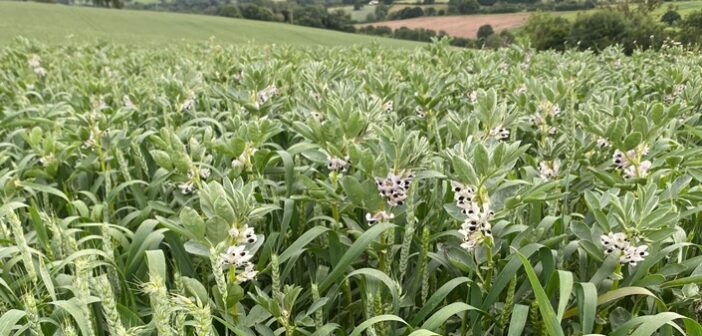Farmers growing wheat in line with Wildfarmed’s audited Regenerative Standards in drinking water catchments can now access additional funding from four UK water companies.
These regenerative standards include not applying pesticides to the growing crop, using companion cropping and integrating livestock to farm in a nature-friendly way. The model is proven to reduce water pollution and improve soil resilience.
Next year, the following water companies will be piloting the “Wildfarmed water premium”:
- Affinity water: offering £75/ha in addition to other regenerative practice payments
- South Staffs and Cambridgeshire Water: offering £200/ha for priority areas
- Wessex Water: offering £200/ha+ in priority areas (exact payment on application)
- Southern Water: offering £175/ha in priority areas
The package is designed to help new and existing growers shift to regenerative farming and ensure Wildfarmed remains a strong financial choice for farmers – especially as Basic Payments are phased out.
The funding can be claimed in addition to premiums Wildfarmed already pays growers following its audited standards. The “Wildfarmed Water Premium” will be available for harvest 2025 winter and spring wheat crops. Wildfarmed growers can apply for the payment directly to water companies.
Environment impact
The annual health and environmental cost of the UK’s food system is around £100 billion, according to Henry Dimbleby, author of the UK’s National Food Strategy. One significant expense is cleaning waterways polluted by agricultural run-off and pesticides, which affects 40% of English rivers.
By partnering with water companies to fund regenerative farmers, Wildfarmed growers are leading the way in delivering clean water. The approach combines private and public investment to reduce future costs associated with water treatment and ecosystem recovery.
This approach is, in turn, proven to unlock value for water companies. Affinity Water, for example, reports a potential six-to-one return on investments when natural capital is accounted for in land that uses regenerative agriculture techniques, such as cover cropping, compared to conventionally farmed land.
Overall, the premiums are designed to shape a better, more sustainable food system. One where stakeholders collaborate to reward farmers not just for the crop but for the quality of the ecosystem in which it was grown.
Andy Cato, co-founder of Wildfarmed, commented: “Farming, which combines food production and nature recovery, offers a massive opportunity to address issues of existential importance: biodiversity, water and health.
“I have yet to meet a farmer who wouldn’t want to grow food in nature-rich landscapes if they could be fairly rewarded for doing so.
“How do we do so while ensuring that food from this kind of farming is affordable for all?
“By measuring and valuing all the other things a regen farmer is doing at the same time as producing food: water quality, biodiversity, carbon, and food quality.
Danny Coffey, Catchment Manager at Affinity water, commented: “Soils farmed in a regenerative way can hold and prevent harmful contaminants getting into water abstracted for public water supply across our catchments and Wildfarmed’s standards go a step further in ensuring that water quality is protected and we do not have to rely solely on energy and carbon intensive, end of pipe treatment.
“Not only can farmers help us protect water, Wildfarmed farmers and their commitment to regenerative agriculture share our aspirations to protect the environment and leave it in a measurably improved state. We hope that paying for this ecosystem service using the water premium will ensure that regenerative farming remains profitable, farmers can continue to invest in their soils for the benefit of both crop and water production and we all work towards creating more resilient water catchments to the impacts of climate change”.




